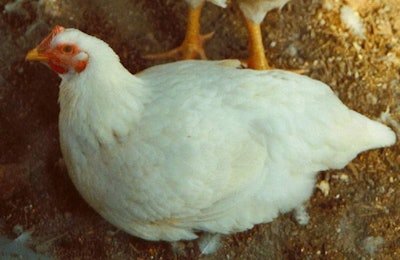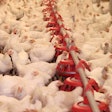
A suspected case of avian influenza (AI) in chickens in Dunfermline in the region of Fife, Scotland, has prompted warnings from the Scottish government to the poultry industry to be particularly vigilant.
Initial test results have indicated presence of an H5 strain of the AI virus, which is notifiable, and clinical signs indicate it is of low pathogenicity. Further testing in underway.
Usual control measures have been put in place to limit the further spread of disease, including humane culling of the affected flock and movement restrictions for the suspected premises and any contacts. A 1-kilometer Temporary Control Zone (TCZ) has been placed around the farm, restricting the movement of poultry, carcasses, eggs, used poultry litter and manure and controls on bird gatherings.
“We have taken immediate action to contain this case as part of our robust procedures for dealing swiftly with avian flu,” said Scotland Chief Veterinary Officer Sheila Voas. “Evidence suggests this is a low severity form of the virus, however, we are taking action to ensure that the disease does not spread or develop into a more severe form. I would urge poultry keepers in the surrounding area to be vigilant for any signs of disease and to ensure they are maintaining good biosecurity on their premises.”
“Livestock owners and the general public should be assured that we are doing everything we can to control and prevent the spread of the disease. Any poultry producers who are concerned should immediately seek veterinary advice,” added Cabinet Secretary for Rural Affairs, Richard Lochhead.
“Based on what we know about this strain of avian influenza and the actions that have been taken, the risk to human health in this case is considered very low,” commented Dr. Jim McMenamin, Consultant Epidemiologist and Respiratory Infection lead for Health Protection Scotland. He added that his organization is working closely with the Animal Health department on the investigation.
“On the basis of current scientific evidence, Food Standards Scotland’s advice is that bird flu does not pose a food safety risk for UK consumers,” said Rita Botto, head veterinarian of Food Standard Scotland.
If an outbreak of AI is confirmed in Fife, it could delay the return of the AI-free status of the United Kingdom poultry industry. Following the previous single outbreak in Lancashire in July of 2015, the disease-free status was due to be announced on February 17, according to the Department for the Environment, Food and Rural Affairs (Defra).
France now has 67 avian flu cases
Since the first confirmed AI outbreak in November of 2015, the agriculture ministry in France in its latest report dated January 11 records a total of 67 outbreaks of AI in 7 departments (regions), all in the south-west of the country. The latest cases are in a flock of 10,000 chickens and 4,000 ducks in the community of Gabat in Pyrénées Atlantiques.















